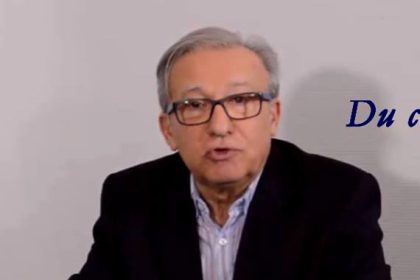EXCLUSIVE INTERVIEW:
‘AFRICAN Journalism Better, Journalists Practicing Under Problematic Conditions’
–Jean Paul Korzec, Ace French Journalist, Winner, Poetry Prize of European Cultural Center
*Says: “There is Journalism School Training Failure in Africa, I’m Looking for a Book Publishing Company in Nigeria”
*REVEALS: “I Had Unforgettable Experience in Nigeria, No Clear Codification between the Press and Other Bodies for Development”
*Laments: “Most Editorials in Worship of Government in Power”
*Regrets: “ Existing European media generally in English, Cater for Higher higher Social Cosmopolitan economic policymakers/Globe-Trotters, Denies Lower Class Readership”
*Confesses: “My Life Punctuated by Hard Times, Complex Adolescence Childhood”
*PLUS: Untold SECRETS behind his Maiden Famous Novel
 Jean Paul Korzec is a well known Poet, Writer, Authour in the whole of France and other Francophone countries. He’s a French citizen, well respected journalist, opinion moulder who believes in power of resilience as he confronted every daunting challenge that crossed his path from childhood into adulthood. In spite of the myriads vicissitude of life, he never quit or gave up. In this Exclusive Interview with CNN iReport Journalist, GEORGE ELIJAH OTUMU, this cerebral and widely traveled Editor of www.jeanpaulkorzec.com a special online publication dedicated for his works’ collection takes us down memory lane on his media sojourn in Nigeria, why there are no qualitative journalism training center in Africa (except few), why journalists should cover tragic events neutrally with no emotions attached, success story of his novel and he started writing poetry at a difficult time of his life.
Jean Paul Korzec is a well known Poet, Writer, Authour in the whole of France and other Francophone countries. He’s a French citizen, well respected journalist, opinion moulder who believes in power of resilience as he confronted every daunting challenge that crossed his path from childhood into adulthood. In spite of the myriads vicissitude of life, he never quit or gave up. In this Exclusive Interview with CNN iReport Journalist, GEORGE ELIJAH OTUMU, this cerebral and widely traveled Editor of www.jeanpaulkorzec.com a special online publication dedicated for his works’ collection takes us down memory lane on his media sojourn in Nigeria, why there are no qualitative journalism training center in Africa (except few), why journalists should cover tragic events neutrally with no emotions attached, success story of his novel and he started writing poetry at a difficult time of his life.
Q: As a respected Editor, Poet of acclaimed international repute, how will you describe European journalism training for aspiring journalists interested in enlarging their horizon in global media?
A: In fact, there are very few European journalism. There is no European public in the media. In addition, there is a big difference of cultures and languages, which does not facilitate things. Information consumption pattern also differs between countries. There is no European public spaces but public spaces. Also, there is not no European journalism training. Existing European media are generally in English and cater to a higher social level of readership, cosmopolitan economic policymakers, globe-trotters..The Franco-German TV channel “ARTE” is the only example of bilingual media. It has some success with viewers more or less intellectual, this channel broadcast quality programs. In general terms it may be noted, as everywhere !!, a decline in occupational requirement, race viewership obliges !!
Q: How best can an Investigative Journalist cover a story and properly disseminate same message to the people without being bias in the eyes of the public?
A: I think a journalist should cover a tragic event neutrally, without highlighting his or her emotions. It is just like a medical doctor facing a difficult case (in his clinic or hospital). But of course without the pathos or sensational, just keep in mind to maintain an editorial line of qualité (quality). Unfortunately, increasingly daily among media professionals is the foolish race to scoop and produce sensational stories that engage the media of all kinds purposely to grab readers, listeners and viewers. This is the reason: “the weight of words and the shock of photos” famous slogan of Paris Match is more relevant than ever.
Q: Will you say African journalism is retarding or progressing?
I must confess that African journalism nowadays has been quite good lately, gradually progressing in levels. But problems related to the condition and status of African journalism, are problematic. Material, human and psychological conditions are essentially and goes by country. There is also a journalism training failure, except for Dakar, Lagos and Yaoundé that possess great level of journalism schools correctly. A new phenomenon dating back approximately 10 years, is the excessive outbreak of private media in Africa. This is in contrast (with reality of today) which raises new problems. Other problems are: Shortage of qualified staff, lack of equipment and especially liability to a local realty still marked by authoritarianism. Also no clear codification of relations between the press and other bodies of the company, necessary for development. Also, editorials (in most publications are made close to the government. But of this proliferation of newspapers few become perennial. Time will sort and deliver the record straight.
Q: How about some of the evergreen media` awards you have won?
A: I won the romantic poetry prize of European cultural center, and my first novel was a great success, going probably in cinema. I also published nice books in Nigeria like ABUJA magazine, following construction of the new city, that is: Nigerian Port authority, Made in Nigeria.. I was always in collaboration with Nigerian authorities. I made also excellent supplement for magazine, especially for Comores. I won the romantic poetry prize of European cultural center, and my first novel was a great success.
Q: Tell us about how your news website is doing?
A: My web site is going quite well, but could be much better. As a matter of fact, i am not very good in new technology that’s why social media technology is not too much working well on the news site. .
What inspired you into poetry?
A:I started writing poetry at a difficult time of my life. That’s when I felt the urge to write to pour out my evil to the core. Then I won a contest of sentimental poetry of the European cultural center. This prompted me to persevere and finally publish a beautiful book of 80 poems all illustrated in watercolors by a painter friend with who i collaborated. Since I regularly write poetry and a second collection will be published this year.
Q: Can you tell us how many poetry books you have read so far and who is your favourite poet?
A: I read quite a lot and obviously a lot of poetry. I own many books of poetry, including the best known: Baudelaire, Rimbaud, Apollinaire, Aragon, Victor Hugo, Russian poets etc … but I also do not really have a favorite poet, they are all talented in their style, and it’s always a treat to read even if you feel very small poet beside them!
Q: What projects as in Books are you presently working on for humanity?
A: I have published in poetry «Dans la brume des rêves» Editions de l’Officine paris -Novels: «Dans l’ombre du père» Editions de l’Harmattan Paris – «Descente en enfer» Editions de l’Officine Paris. I am writing a new book that will be out towards end of the year1 and i am looking for a publisher for my last book in English preferably in Nigeria. .» Descente en enfer «translated is «Trip to hell» a story based on 419 business in the 80’ where action is in Lagos mainly.
Q: How do you ensure Pirates are not feasting on your books?
12. In fact I don’t care much about piracy because my published books are protected, so i have no fear, may be a mistake.
Q: How will you describe your Childhood into Adulthood?
A: I had a comfortable and a more complex adolescence childhood. My early adult years were very difficult, through periods of existentialism, depression, and severe blows to cash, mainly because of my father. I build myself little by little, my early life was laborious, with no real foundation in anything. All my life was punctuated by hard times, which makes me write, writing has been my therapy, at least I think so. My first novel recounts all this, and a contract for the cinema is being under negotiation. I love my job which also helped me a lot and brought me comfort. The experience, sometimes very tough in Nigeria remains my great unforgettable moment in my life.



